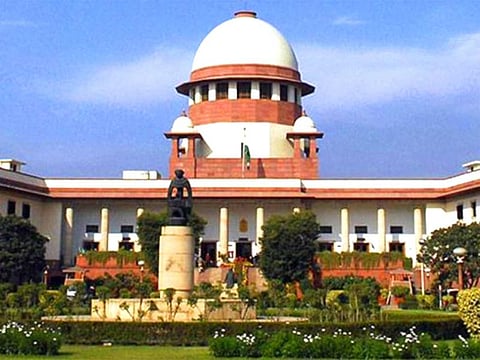Governor cannot stall bills forever, but courts can’t fix deadlines: India Supreme Court
Bench rejects timelines for president and governors but says inaction open to review

In a sweeping constitutional clarification, the Supreme Court on Thursday held that while Governors and the President cannot be bound by judicially imposed timelines in granting assent to Bills, they also cannot keep legislation pending indefinitely.
A five-judge Constitution Bench said the Constitution provides only three options to a Governor and rejected the earlier notion of “deemed assent”, calling it contrary to the separation of powers.
The ruling came in response to President Droupadi Murmu’s Article 143 reference seeking clarity after a two-judge Bench, in the Tamil Nadu Governor case, effectively set deadlines for the Governor and the President to decide on Bills.
Seeking the court’s opinion, the President had asked: “In the absence of a constitutionally prescribed time limit, and the manner of exercise of powers by the Governor, can timelines be imposed and the manner of exercise be prescribed through judicial orders for the exercise of all powers under Article 200 of the Constitution of India by the Governor?”
She also asked whether the President’s constitutional discretion under Article 201 is justiciable, and: “Is the Governor bound by the aid and advice tendered by the Council of Ministers while exercising all the options available with him when a Bill is presented before him under Article 200 of the Constitution of India?”
Referring to Article 361, the President noted that “the President or the Governor shall not be answerable to any court for the exercise of the powers and duties of office”.
Bench rejects timelines, clarifies powers
A Constitution Bench led by Chief Justice of India B.R. Gavai said the imposition of a timeline is “strictly contrary” to the Constitution. The Bench reiterated that the Constitution gives the Governor only three “clear options”: to grant assent, return the Bill with comments, or reserve it for the President.
“We hold that the Governor does not have the power to simpliciter withhold,” the court said. “The three clear options he has are to either grant assent, return the Bill to the legislature with comments, or refer it to the President. He has discretion in choosing any of these three options.”
The judges stressed that such discretion “cannot allow him to hold Bills in perpetuity”, and that “it is the elected government, the Cabinet, that should be in the driver’s seat and that there cannot be two executive power centres”.
In its broader articulation of constitutional design, the court said Articles 200 and 201 are framed to provide “a sense of elasticity, for constitutional authorities to perform their functions, keeping in mind the diverse contexts and situations, and by consequence the need for balancing that might arise in the process of law making in a federal, and democratic country like ours. The imposition of timelines would be strictly contrary to this elasticity that the Constitution so carefully preserves.”
The Bench added: “There is no denying, that judicial review too, is a part of the basic structure of the Constitution of India. This judicial review, however, is not an unbridled scope that can negate or destroy the separation of powers doctrine.”
No ‘deemed assent’
The court categorically rejected the two-judge ruling that declared 10 Tamil Nadu Bills “as deemed to have been assented”.
It said: “Deemed consent of the Governor, or President, under Article 200 or 201 at the expiry of a judicially set timeline, is virtually a takeover, and substitution, of the executive functions by the Judiciary, through judicial pronouncement, which is impermissible within the contours of our written Constitution.”
The Bench noted that while the merits of a Governor’s action cannot be scrutinised, “inaction that is prolonged, unexplained and indefinite, will certainly invite limited judicial scrutiny.”
It also warned that no constitutional organ can function in isolation. “The working of our constitutional scheme is premised on constitutional authorities — who are each assigned specific but inter-dependent roles — performing their duties, akin to cogs that keep a clock ticking. They depend on each other, to keep the Constitution humming, and thus, working.”
The Tamil Nadu case
The dispute originated from an April 8 judgment by a Bench of Justice J.B. Pardiwala and Justice R. Mahadevan in The State of Tamil Nadu vs The Governor of Tamil Nadu, where the DMK government accused Governor R.N. Ravi of indefinitely withholding Bills. Invoking Article 142, the Bench had declared 10 Bills “as deemed to have been assented on the date when they were presented to the Governor”.
“We are in no way undermining the office of the Governor. All we say is that the Governor must act with due deference to the settled conventions of parliamentary democracy; respecting the will of the people being expressed through the legislature as - well as the elected government responsible to the people,” the judgment had noted.
The same ruling urged restraint by the Union executive when a Bill involves constitutional questions. “It is expected that the Union executive should not assume the role of the courts in determining the vires of a bill and should, as a matter of practice, refer such question to the Supreme Court under Article 143. We have no qualms in stating that the hands of the executive are tied when engaging with purely legal issues in a bill and only the constitutional courts have the prerogative to study and provide recommendations as regards the constitutionality of a bill,” the court had said.
- with inputs from IANS
Sign up for the Daily Briefing
Get the latest news and updates straight to your inbox




